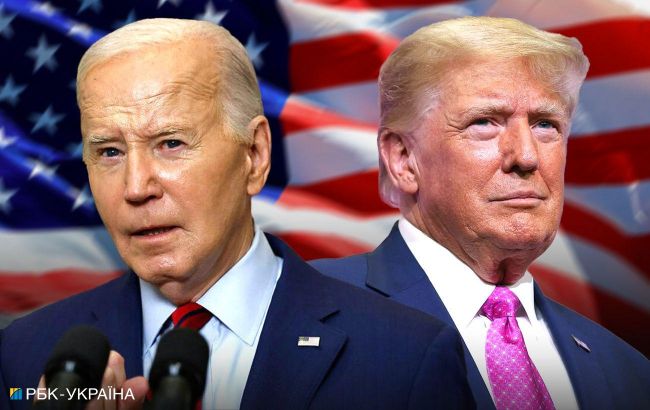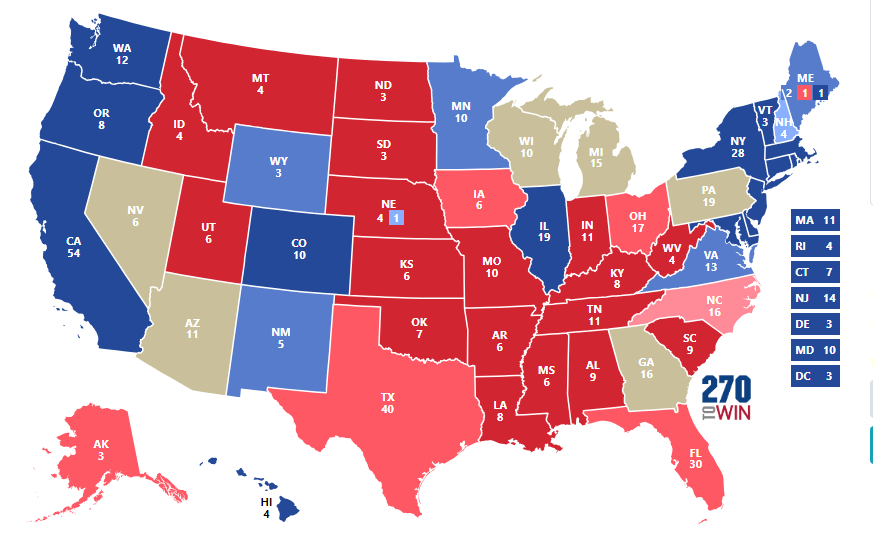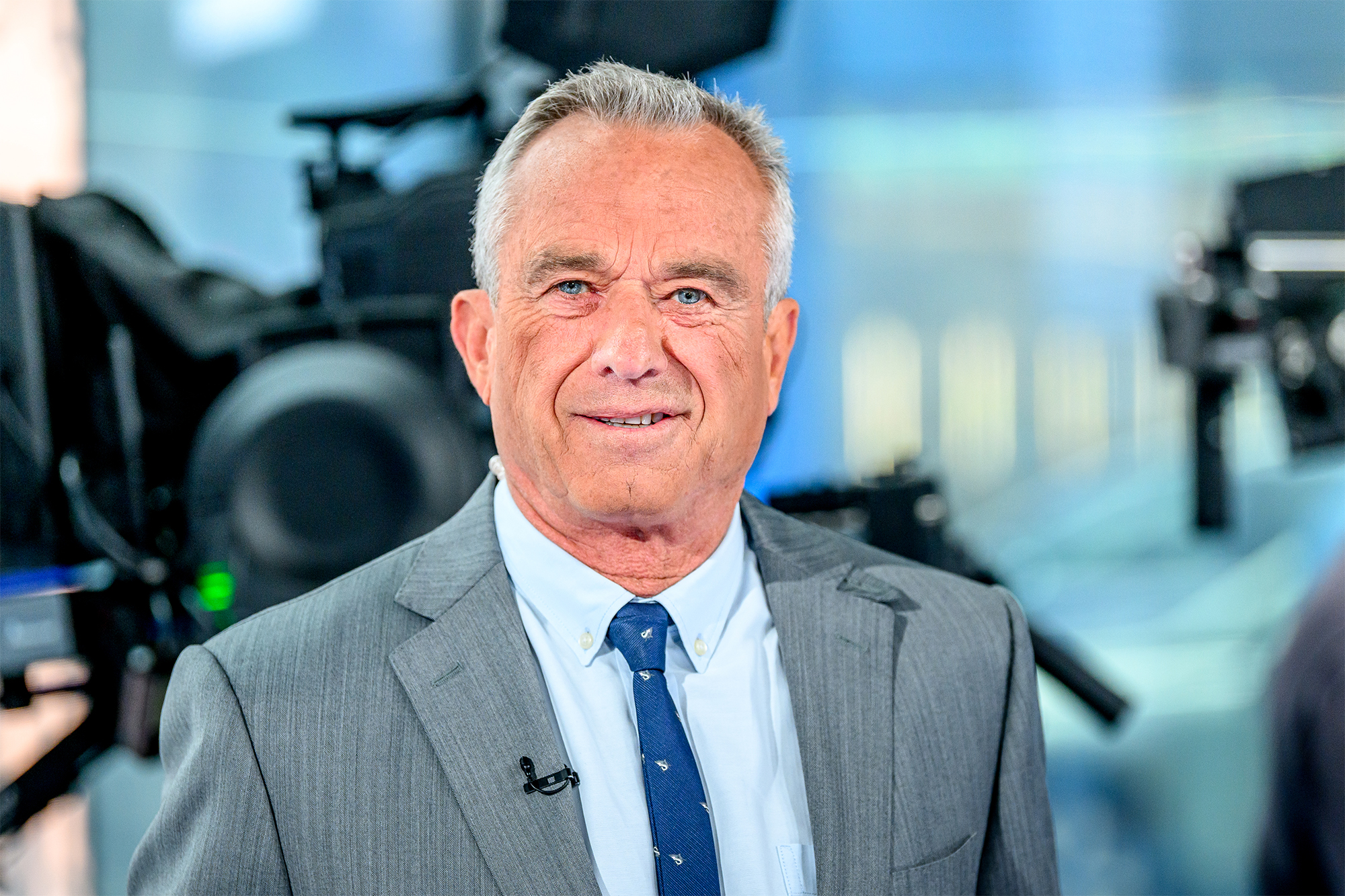Different rules: How US to elect its president and what surprises might arise
 Joe Biden and Donald Trump (photo: RBC-Ukraine collage)
Joe Biden and Donald Trump (photo: RBC-Ukraine collage)
How Americans choose a president, what are swing states, and whether there are other candidates besides Biden and Trump - RBC-Ukraine answers key questions about this year's main election.
On November 5 this year, the US will hold a presidential election. Traditionally, they will be decisive for the future of the country and the entire world. But this time, the price of victory, particularly for Ukraine, is particularly high. If Joe Biden retains the presidency, we should expect that Washington's policy toward Kyiv will remain unchanged. If Donald Trump manages to return to the White House, the consequences for Ukraine in its confrontation with Russia will be unpredictable.
Below are answers to the main questions related to the US presidential election.
Contents
- How do the Americans vote?
- What are swing states and how do they determine fate of vote?
- Why do people in US always talk about only two presidential candidates?
- How does voting take place?
- Can Donald Trump be removed from race?
How do the Americans vote?
The main feature of the presidential election in the United States is that the winner is not the one who receives the majority of votes, but the one who is voted for by the Electoral College. This system is called an indirect election.
In practice, American electors vote for one of the candidates. After the votes are counted at the level of each state, the winner is determined, who will be able to delegate a certain number of people (usually activists of the party that nominated him) to the Electoral College.
Currently, the Electoral College consists of 538 people, so to become president, a candidate must receive the support of at least 270 of them. The bigger the state, the more electors it has, but there are noticeable distortions in favor of small states. For example, in huge California, there is one elector per 600,000 voters, and in sparsely populated Wyoming, there is one per 200,000.
Almost everywhere, the vote winner in a particular state gets all the electoral college seats that belong to that state, and the gap between the second place and the second place does not matter. The exceptions are Nebraska and Maine.
Such a two-stage system leads to the fact that the candidate who received the majority of American votes may not become president in the end. This has happened five times in the United States, and twice since the late 19th century. In 2000, George W. Bush became president, having received half a million votes less than his opponent Albert Gore. And in 2016, Donald Trump defeated Hillary Clinton by almost three million fewer votes nationwide.
Electors from each state usually vote for the winning candidate in that state. There have been cases when they have voted for a rival candidate, but these defections have never affected the outcome of the election.
What are swing states and how do they determine fate of vote?
Most states in the US are divided into red and blue. In red states, the Republican Party is more popular, and in blue states, the Democratic Party is more popular. At the same time, voters' preferences are quite stable, and it is almost impossible to shake them during one presidential campaign.

Map of red and blue states in the United States (Photo: 270towin.com)
This means that there is no point in campaigning for them if the outcome of the election is clear in advance. Moreover, it doesn't matter whether the winner gets 55% or 99% of the votes in a given state - they will still get the same number of electors from that state.
Therefore, in every election, there are usually a few swing states where the gap between the candidates is small and campaigning makes sense. Usually, these states receive disproportionate attention from candidates to the detriment of others, especially in the last weeks before the election.
The list of swing states changes smoothly over time. In the 2024 election, there are usually six: Wisconsin, Michigan, Pennsylvania, Nevada, Arizona, and Georgia.
Why do people in US always talk about only two presidential candidates?
The exclusively majoritarian system of election in the United States, based on the winner-take-all principle, has led to the historical dominance of only two parties: Republican and Democratic. Consequently, only candidates nominated by them have a real chance of winning. Since the mid-19th century, only they have become US presidents.
Nevertheless, in the US, more than two people usually run for president, for example, in the 2020 election, ten candidates were nominated. At the same time, each state determines the composition of the ballot independently, imposing conditions on candidates, such as collecting a certain number of signatures or posting a deposit (many candidates from small parties or non-partisan parties are eliminated at this stage).
As a rule, third party candidates (neither Democratic nor Republican) win only a few percent or even fractions of a percent of the vote in the election. Since the 1990s, the best third party candidate has been businessman Ross Perot, who won 19% and 8% of the vote in the 1992 and 1996 elections, respectively (but such high numbers are the exception to the rule).
But in a highly competitive election like the current one, even fractions of a percentage of third candidates can affect the overall outcome. For example, the fate of the election 2000 was decided in Florida, where George W. Bush won by only five hundred votes over Albert Gore. The practice of nominating spoilers (candidates who are unelectable in advance and whose only task is to take votes away from their opponent) is not typical of American politics. However, some third candidates can play the role of such spoilers in practice.
Several third-party candidates have already announced their candidacies for the current election. If we eliminate the completely marginal politicians, it makes sense to pay attention to the likely nominee of the Green Party, Jill Stein, for whom this may be her third presidential election. In 2016, she won just over a percentage of the national vote, and following the election she was accused of having ties to Russia, which allegedly supported her. If Stein runs in the 2024 election, she will take votes away primarily from Biden.
Another third candidate is philosopher and political activist Cornel West, who is running as an independent. In those states where he can get on the ballot, he will mostly take votes away from Biden as well.
But the most notable third candidate is Robert Francis Kennedy Jr, the nephew of former US President John F. Kennedy. A well-known lawyer and environmental activist in the past, he later began to voice more and more extravagant views. In particular, during the coronavirus pandemic, he became a well-known anti-vaccinationist, supporting various conspiracy theories: from the impact of 5G technologies on cancer to accusations against Bill Gates of his intentions to chip humanity.
 Robert Francis Kennedy Jr. (Photo: Getty Images)
Robert Francis Kennedy Jr. (Photo: Getty Images)
Kennedy Jr. originally intended to run for the Democratic Party nomination, but as expected, he did not find support and is now running for president as an independent. He failed to get on the ballot in most states, but may well influence the outcome of the election in some swing states. In polls across the country, he is gaining about 8-10% of support. Most importantly, he takes these votes away from Biden and Trump in roughly equal parts, but the proportion changes over time. The Kennedy factor may ultimately be decisive for the outcome of the presidential election.
How does voting take place?
Most Americans vote traditionally, with paper ballots at the polling station. Instead of ballot boxes, many polling stations are equipped with special machines for reading ballots, which greatly speeds up their counting. Electronic voting machines with touch screens are also popular. In addition, early voting and voting by mail are very common - the latter option was especially popular in the last 2020 election, at the height of the coronavirus pandemic.
It is noteworthy that voters usually do not need to show a passport or other identification document, such as a driver's license, when voting. It is enough to identify yourself and sign, and a member of the commission will check the signature with the one that was put during the registration and issue a ballot. Pre-registration in the United States is mandatory to participate in election, except for North Dakota.
Another feature of the US election is that in many states, voters can write in the candidate they like on the ballot. And anyone - in electoral practice, there have been examples of voting for Mickey Mouse and Jesus Christ. But sometimes an inscribed candidate can show a decent result - for example, socialist Bernie Sanders in the 2016 election thus collected more than a hundred thousand votes across the country.
Can Donald Trump be removed from race?
The former US president and Republican nominee faces nearly a hundred charges in four criminal cases. The first of them, about the concealment of hush money payments to porn star Stormy Daniels, is due to end soon. But even if a guilty verdict is upheld, it will not affect Trump's ability to be elected.
First, Trump is likely to appeal it in higher courts, and these proceedings are unlikely to end before the election. Secondly, American law does not prohibit not only convicts but also those who are serving real terms behind bars from running for office. For example, in 1920, socialist candidate Eugene Debs campaigned from prison and eventually won 3.5% of the vote nationwide. Other attempts to remove Trump from the election, for example, because of his involvement in the storming of the Capitol in early 2021, also failed.
Paradoxically, if found guilty, Trump will be able to run for president, but he will not be able to vote. In almost all US states, those convicted in criminal cases are not allowed to vote in elections.
We also explained whether Trump has changed his negative attitude towards Ukraine.
Read also how Joe Biden can successfully be re-elected for a second presidential term.
Sources: 270towin, The Washington Post, BBC, USA.gov.

